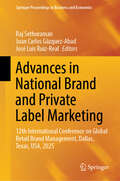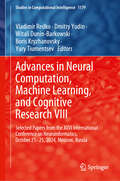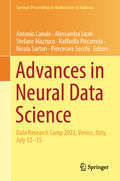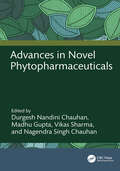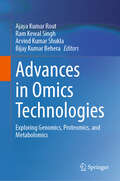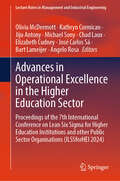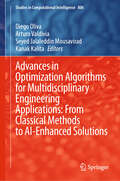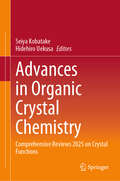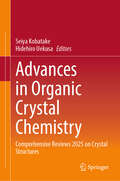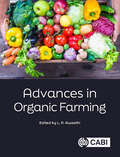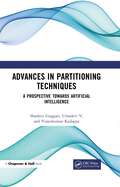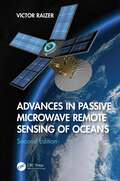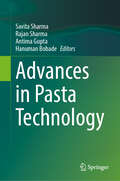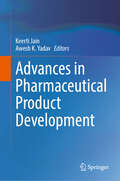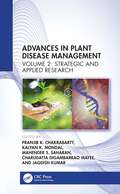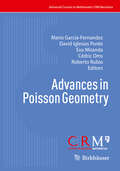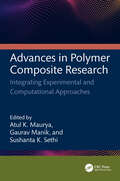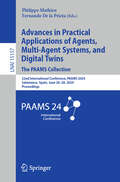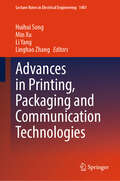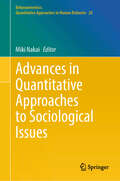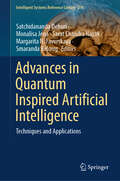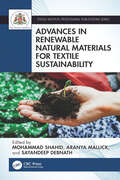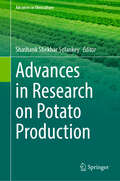- Table View
- List View
Advances in National Brand and Private Label Marketing: 12th International Conference on Global Retail Brand Management, Dallas, Texas, USA, 2025 (Springer Proceedings in Business and Economics)
by Juan Carlos Gázquez-Abad Raj Sethuraman José Luis Ruiz-RealThe 2025 International Conference on Global Retail Brand Management is a unique academic forum to present and discuss original, rigorous, and significant contributions from researchers around the world on marketing issues facing retailers, store brand managers, and national brand managers.The three-day event covered a wide range of topics from various fields including retailing, marketing, general business, psychology, economics, and statistics. The conference addressed diverse areas of application such as customer journey, sustainability, the metaverse, online grocery retailing, assortment branding strategies, innovation, labeling, and co-creation, among others. A wide variety of theoretical and methodological approaches have been used in these areas.This volume presents the proceedings of the 2025 NB&PL marketing conference in a collection of original, rigorous, and relevant contributions.
Advances in Neural Computation, Machine Learning, and Cognitive Research VIII: Selected Papers from the XXVI International Conference on Neuroinformatics, October 21-25, 2024, Moscow, Russia (Studies in Computational Intelligence #1179)
by Boris Kryzhanovsky Witali Dunin-Barkowski Vladimir Redko Yury Tiumentsev Dmitry YudinThis book describes new theories and applications of artificial neural networks, with a special focus on answering questions in neuroscience, biology and biophysics and cognitive research. It covers a wide range of methods and technologies, including deep neural networks, large-scale neural models, brain–computer interface, signal processing methods, as well as models of perception, studies on emotion recognition, self-organization and many more. The book includes both selected and invited papers presented at the XXVI International Conference on Neuroinformatics, held on October 21–25, 2024, in Moscow, Russia.
Advances in Neural Data Science: Data Research Camp 2022, Venice, Italy, July 12–15 (Springer Proceedings in Mathematics & Statistics #475)
by Piercesare Secchi Antonio Canale Nicola Sartori Stefano Mazzuco Alessandra Luati Raffaella PiccarretaThis proceeding volume will contain a collection of peer-reviewed articles arising from the Data Research Camp 2022. The workshop took place on July 12–15, 2022, at the Venice International University, in the venetian island of San Servolo. The Data Research Camp has been a stimulating experience bringing together 28 early-career researchers in statistics and seven international professors with the common task of developing novel statistical methods for complex brain imaging data. The workshop was motivated by the recent advancements in miniaturized fluorescence microscopy that have made it possible to collect complex data on neuronal responses to stimuli in awake behaving animals. Several ongoing challenges are related to this novel technology including the deconvolution of the temporal signals to extract the spike trains from the noisy calcium data, the estimation of neuronal activation intensity distribution, the spatio-temporal dependence or covariate effect estimation, among others.
Advances in Novel Phytopharmaceuticals
by Madhu Gupta Durgesh Nandini Chauhan Vikas Sharma Nagendra Singh ChauhanAdvances in Novel Phytopharmaceuticals covers the current aspects of the development of novel herbal formulations and summarizes their type of active components, biological activity, applications, and toxicity associated with novel herbal formulations. Such distinct types of novel herbal formulations are described to have remarkable advantages over conventional formulations of plant actives and extracts. The book also covers the various herbal phytoconstituents used for novel drug delivery applications. These novel herbal formulations can be used more uprightly and with enhanced efficacy by incorporating them into modern dosage forms. This can be accomplished by designing novel drug delivery systems for herbal ingredients. This book provides key information for everyone interested in novel phytodrug delivery systems and drug discovery, including medicinal chemists, cosmetic experts, nutritionists, toxicologists, drug formulators, and healthcare professionals. Students, professors, and researchers working in pharmaceutical sciences and beyond will also find the book useful.We will also focus on patent filed, technology transfer, market potential, and regulatory aspects of herbal nanomedicines, if any. Research in this area is still in the exploratory stage, and in the market there are no books available that summarize all the contents of the research. As such, we will try to make our full contribution to this area. This book is the continuation of a first volume and readers and the target audience will gain all the latest knowledge in the subject.Aims and scopeð To understand the basic information and application of phytoconstituentsð To understand the various phytoconstituents-based formulations for disease managementð To understand the herbal drugs used for cosmetic applicationsð To understand the phytodrug delivery systems and their applicationsð To provide detailed knowledge about the technical aspects of formulationð To update readers with the latest research progress in this emerging research areað To provide the details about the patents filed, technology transfer, market potential, and regulatory aspects for the same
Advances in Omics Technologies: Exploring Genomics, Proteomics, and Metabolomics
by Bijay Kumar Behera Ajaya Kumar Rout Ram Kewal Singh Arvind Kumar ShuklaThis comprehensive volume offers an in-depth exploration of the latest advancements in omics technologies and their practical applications across environmental science, agriculture, healthcare, and biotechnology. Covering key topics such as metagenomics for identifying beneficial microbes, bioremediation for environmental cleanup, bacteriophages, proteomics, epigenomics, and CRISPR-Cas9 genome editing, the book provides valuable insights into cutting-edge tools and methodologies. It also delves into next-generation sequencing, biosensor technology, bioinformatics tools, mass spectrometry-based metabolomics, as well as emerging fields like nutrigenomics and microarrays technology. With clear explanations and practical perspectives, this authoritative resource is ideal for students, researchers, and professionals striving to stay abreast of innovations in life sciences and contribute to the rapidly evolving landscape of omics sciences.
Advances in Operational Excellence in the Higher Education Sector: Proceedings of the 7th International Conference on Lean Six Sigma for Higher Education Institutions and other Public Sector Organisations (ILSSforHEI 2024) (Lecture Notes in Management and Industrial Engineering)
by Jiju Antony Chad Laux Elizabeth Cudney Olivia McDermott Angelo Rosa José Carlos Sá Kathryn Cormican Michael Sony Bart LameijerThis book reports on advances in applications of Lean Six Sigma and Operational Excellence in Higher Education Institutes and in other Public Sector organisations with a special emphasis on Kaizen, Lean, Business Excellence Models, and Digitisation. Further topics include Leadership for Higher Education Institutes and public sectors in Operational Excellence and building a culture for Operational Excellence. Chapters report on theoretical research and case studies concerning Operational Excellence, Lean Six Sigma and Quality Management applications. Based on the 7th International Conference on Operational Excellence in Higher Educational Institutes and other public sector organisations (2024), held on September 2nd-3rd, 2024, at the University of Galway in Ireland, this book offers a timely reference for both academics and professionals in the broad field of Operational Excellence.
Advances in Optimization Algorithms for Multidisciplinary Engineering Applications: From Classical Methods to AI-Enhanced Solutions (Studies in Computational Intelligence #806)
by Diego Oliva Kanak Kalita Arturo Valdivia Seyed Jalaleddin MousaviradThis book is an authoritative compilation of the latest advancements in optimization techniques. This book covers a wide array of methods ranging from classical to metaheuristic to AI-enhanced approaches. The chapters are meticulously selected and organized in three sections—metaheuristics, machine learning and engineering applications. This allows for an in-depth exploration of diverse topics ranging from image processing to feature selection to data clustering, to practical applications like energy optimization, smart grids, healthcare diagnostics, etc. Each chapter delves into the specific algorithms and applications as well as provides ample theoretical insights. Accordingly, this book is ideally suited for undergraduate and postgraduate students in fields such as science, engineering and computational mathematics. It is also an invaluable resource for courses on artificial intelligence, computational intelligence, etc. Researchers and professionals in evolutionary computation, artificial intelligence and engineering will find the material especially useful for advancing their work and exploring new frontiers in optimization.
Advances in Organic Crystal Chemistry: Comprehensive Reviews 2025 on Crystal Functions
by Hidehiro Uekusa Seiya KobatakeThis book summarizes and records the recent notable advances in diverse topics in organic crystal chemistry, which has made substantial progress along with the rapid development of a variety of analysis and measurement techniques for solid organic materials. This volume follows previously published volumes that are prepared periodically, at least every 5 years, with contributions by prominent authors in Japan and from abroad. The first volume was published in 2015, which systematically summarized the remarkable progress in assorted topics of organic crystal chemistry using organic solids and organic–inorganic hybrid materials. The second volume, published in 2020, presented advances in organic solid-state chemistry mainly from 2016 to 2020. The present volume also shows the progress of organic solid-state, especially focusing on crystalline functional materials with mechanical, luminescent, electrical and magnetic properties that have been achieved mainly in the last 5 years or so. The topics that this book dealt with, which have been rapidly developed in the last decade, will be of interest not only to researchers of organic crystals but also to those in photochemistry, materials chemistry molecular science and applied physics.
Advances in Organic Crystal Chemistry: Comprehensive Reviews 2025 on Crystal Structures
by Hidehiro Uekusa Seiya KobatakeThis book summarizes and records the recent notable advances in diverse topics in organic crystal chemistry, which has made substantial progress along with the rapid development of a variety of analysis and measurement techniques for solid organic materials. This volume follows previously published volumes that are prepared periodically, at least every 5 years, with contributions by prominent authors in Japan and from abroad. The first volume was published in 2015, which systematically summarized the remarkable progress in assorted topics of organic crystal chemistry using organic solids and organic–inorganic hybrid materials. The second volume, published in 2020, presented advances in organic solid-state chemistry mainly from 2016 to 2020. The present volume also shows the progress of organic solid-state chemistry, especially focusing on crystal growth and crystal structure design that has been achieved mainly in the last 5 years or so. Crystal growth and crystal structure design described in this book is helpful for not only readers who study organic crystals but also those who study inorganic crystals, materials chemistry, coordination chemistry, and organometallic chemistry.
Advances in Organic Farming
by L. P. AwasthiThis book describes critically reviewed key aspects of organic farming and provides a unique and timely science-based resource for researchers, teachers and extension workers, undergraduates, postgraduate students, primary producers and others interested in organic farming. The first section of the book provides an overview of organic farming: a general introduction followed by the origins of organic farming, the principles of organic farming, challenges for organic farming, crop protection in organic farming and environmental impacts of organic farming. The next section deals with the management of various crop diseases through botanical biopesticides and Integrated Pest Management practices, followed by overarching regulatory and management concerns. The book is written by a range of specialists with direct experience of organic farming over many years. Authors from over a dozen countries in several continents have contributed to this unique and indispensable resource that offers a diverse range of valuable information, data and perspectives on organic farming, at a time when the world community is increasingly aware of the problems of our current agricultural practices and the importance of creating sustainable agricultural and systems for the long-term health of humankind and the biosphere as a whole.
Advances in Partitioning Techniques: A Prospective towards Artificial Intelligence
by Shankru Guggari Umadevi V Vijayakumar KadappaThis book discusses various partitioning strategies tailored for traditional machine learning algorithms. It examines how data can be divided efficiently to enhance the performance and scalability of classic machine learning models. It explores how partitioning methods can be applied to neural networks and other deep learning architectures and describes various ways to accelerate training, reduce memory consumption, and enhance overall efficiency.Graphs are prevalent in various AI domains. This book is specifically designed for graph data structures using partitioning techniques and also explores insights into optimizing graph algorithms and analytics. With the explosion of data, efficient partitioning becomes crucial for processing large datasets. This book discusses various partitioning techniques that enable effective management and analysis of big data, enhancing speed and resource utilization. Edge computing demands resource-efficient strategies. It examines partitioning methods tailored for edge devices, enabling AI capabilities at the edge while addressing resource. This book showcases how partitioning techniques have been successfully applied across various AI domains. It demonstrates real-world scenarios where partitioning optimizes AI algorithms and systems.By bridging the gap between theory and practical applications, this book intends to equip researchers, practitioners, and students with invaluable insights into harnessing partitioning for optimizing AI-driven systems, data processing, and problem-solving strategies. It describes the various advantages and disadvantages of partitioning techniques. This book is a vital resource, illuminating the path towards unlocking the full potential of partitioning in shaping the future of AI technologies.
Advances in Passive Microwave Remote Sensing of Oceans
by Victor RaizerThis new edition introduces the fundamentals of passive microwave remote sensing of oceans, including the physical principles of microwave radiometry, novel observational data, their interpretation, and applications. It not only demonstrates and examines the recent advantages and state of the art of microwave data but also provides guidance for explaining complex ocean studies and advanced applications. All chapters are thoroughly updated with detailed analysis of space‑based microwave missions, and a new chapter on space‑based microwave radiometer experiments has been added. This book discusses the power of microwave remote sensing as an efficient tool for diagnostics of ocean phenomena in research and education.Features New to this Edition:• Includes a new chapter and additional data, images, illustrations, and references.• Uses ocean microwave data, acquired from different platforms, to illustrate different methods of analysis and interpretation.• Updates information on recent and important satellite missions dedicated to microwave remote sensing of oceans.• Offers more detailed analysis of multiband microwave data and images.• Provides examples of microwave data that cover different ocean environmental phenomena and hydro‑physical fields, including global and local ocean features.• Presents additional material on advanced applications, including detection capabilities.This book is intended for postgraduate students and professionals working in fields related to remote sensing, geography, oceanography, civil, environmental, and geotechnical engineering.
Advances in Pasta Technology
by Rajan Sharma Savita Sharma Antima Gupta Hanuman BobadePasta is a conventional Italian product made from durum wheat semolina and characterized by high protein content, firm shape and texture. Extrusion technology allows incorporation of a variety of ingredients to pasta such as legumes, millets, pseudo cereals and others including mushrooms, tubers and pigmented components to enrich conventional pasta. It is a convenient, popular and versatile product, offering the food industry and researchers the opportunity to offer high nutritional quality by using alternative ingredients of nutritive excellence with a high concentration of bioactive components which induce several health benefits through antioxidative pathways. To deal with compromised functional properties of resultant pasta, different techno-functional interventions including use of hydrocolloids and modification of flours which are used to improve rheological and textural profile are necessary.Advances in Pasta Technology documents the history of pasta and its rise from niche to mainstream. The book is divided into 4 sections including an introduction that covers pasta history, global market statistics, traditional pasta making technology and processing along with quality characteristics. Another section is dedicated to nutritive valorization of pasta including modulation in the bio-functional characteristics as a function of ingredients including development of gluten free pasta, micronutrient fortification approach and use of protein, fibre and antioxidant rich flours as potential alternative ingredients. Further sections focus on technological approaches to enhance the performance of specialty pasta including additives, modification of flours and processing techniques and quality management, plant project profile and cost analysis details. This text highlights every aspect of pasta science, technology and market control.
Advances in Pharmaceutical Product Development
by Keerti Jain Awesh K. YadavThis book discusses the stages involved in pharmaceutical product development including the importance, requirement, and effect of each stage and process. It also covers prototype development for pharmaceutical formulations, scale-up studies, optimization, testing, packaging, and commercialization of different dosage forms for pharmaceutical products like tablets, suspensions, emulsions, coating, inhalational products, sterile products, and herbal formulations. The book also presents advancements in tablet production and tablet coating, including materials, material handling, granulation and granulation technologies, process automation, processing problems in tablet production and troubleshooting, advances in equipment for coating and coating materials. Further, the chapter explores the advances in the formulation and development of aerosols, nebulizers, inhalers, metered Dose Inhalers (MDI), and dry powder Inhalers (DPIs). Towards the end, the book examines the challenges, formulation development, testing, stability, and regulatory guidelines in the development of herbal formulations. This book provides a valuable source of information for the researcher, scientists, students, and people working in the area mainly focused on the challenges in pharmaceutical product development.
Advances in Plant Disease Management Volume II: Strategic and Applied Research
by Pranjib K. Chakrabarty Kalyan K. Mondal Mahender S. Saharan Charudatta Digambarrao Mayee Jagdish KumarAdvances in Plant Disease Management: Volume II: Strategic and Applied Research is an invaluable compilation for researchers/students/stakeholders/policymakers in agriculture. This book aims to offer the latest understanding of how fundamental and basic research can be translated toward the engineering of biotic stress-resilient crops through applied and strategic management of plant diseases. Volume I clearly explained the updated knowledge on basic and applied phenomena of pathogen’s interplay with the host, the host immune system, crosstalks among downstream regulating molecules as unraveled through genomics, proteomics, metabolomics, bioinformatics, and molecular studies. This volume of the book equips readers with the knowledge and understanding to confidently employ this basic information in the formulation of management strategies for major crop plant diseases.This book offers comprehensive coverage of the research advances in plant disease management, including: Newer insight into pest risk analysis (PRA) and its significance in international trade. Developments in eco-friendly green technologies that are safe for both humans and the environment to manage diseases. Use of AI tools for diagnosis, development of models for advanced prediction of the outbreak of epidemics, and need-based application of agrochemicals and their appropriate formulations for use through drones. The information regulation and use of biostimulants for biotic and abiotic resilience. Plant protection policies that support the agricultural production system from a global perspective.
Advances in Poisson Geometry (Advanced Courses in Mathematics - CRM Barcelona)
by Roberto Rubio Eva Miranda Mario Garcia-Fernandez David Iglesias Ponte Cédric OmsThis book presents recent advances in topics related to Poisson geometry originating from lectures given at the &“Poisson School&” held in 2022 at the CRM in Barcelona. The purpose is to give both an introduction to this active field of research as well as highlight new trends in related topics. The texts cover both classical results, known to experts in the field, as well as recent and previously unpublished mathematical results. Graduate students and early-stage researchers with basic knowledge in differential and symplectic geometry, together with established researchers that are keen to dive into this rapidly growing field of research, will find this book a useful resource.
Advances in Polymer Composite Research: Integrating Experimental and Computational Approaches
by Gaurav Manik Sushanta K. Sethi Atul K. MauryaThis book emphasizes the importance of experimental characterization techniques and computational modeling tools in polymer composites. The topics covered include finite element analysis, computational fluid dynamics, molecular dynamics simulations, machine learning, material informatics, multiscale modeling, advanced characterization techniques, and the emerging field of nanocomposites. Each chapter provides detailed discussions, case studies, and examples to illustrate the practical application of these techniques in polymer composite research.Features: Offers a comprehensive exploration of polymer composites encompassing both experimental and computational approaches. Showcases most recent findings, methodologies, technologies, and applications in the field. Explores real-world case studies, industrial applications, and potential commercialization opportunities. Discusses the understanding, analysis, and design of polymer composites. Includes LAMMPS-, Ansys-, ABAQUS-, and Materials Studio-based simulation examples. This book is aimed at graduate students and researchers in polymers, polymer composites, and materials science.
Advances in Practical Applications of Agents, Multi-Agent Systems, and Digital Twins: 22nd International Conference, PAAMS 2024, Salamanca, Spain, June 26–28, 2024, Proceedings (Lecture Notes in Computer Science #15157)
by Fernando De la Prieta Philippe MathieuThis book constitutes the refereed proceedings of the 22nd International Conference on Practical Applications of Agents and Multi-Agent Systems, PAAMS 2024, held in Salamanca, Spain, during June 26-28, 2024. The 26 full papers and 6 short papers included in this book were carefully reviewed and selected from 64 submissions. The PAAMS 2024 proceedings focus on the development and deployment of agents and multi-agent systems and their real-world applications.
Advances in Printing, Packaging and Communication Technologies (Lecture Notes in Electrical Engineering #1401)
by Min Xu Li Yang Linghao Zhang Huihui SongThis book includes original, peer-reviewed research papers from the 15th China Academic Conference on Printing and Packaging (CACPP 2024), held in Tianjin, China on November 14-16, 2024. The proceedings cover the latest findings in color science and technology, image processing technology, digital media technology, mechanical and electronic engineering and numerical control, materials and detection, printing and packaging technology, and so on. As such, the book is of interest to university researchers, R&D engineers and graduate students in the fields of color science, image science, materials science, computer science, digital media, network technology, smart manufacturing technology and printing and packaging.
Advances in Psychology and Law: Volume 7 (Advances in Psychology and Law #7)
by Brian H. Bornstein Monica K. Miller David DeMatteoThis book delivers a comprehensive examination of contemporary issues at the intersection of psychology and law, reflecting the latest advancements and research in these critical fields. Authored by leading experts, it offers in-depth insights into key topics, including police use of force, hate crimes, and forensic assessments, making it an essential resource for practitioners, researchers, and policymakers. Key highlights include: The impact of psychological research on legal processes and decision-making. Current trends in understanding and addressing police use of force. Insights into the rising prevalence and complexity of hate crimes. This book's authoritative content, grounded in the latest empirical evidence, makes it indispensable for professionals in psychology, law, criminal justice, and public policy. It's also a valuable tool for educators and students aiming to stay abreast of the rapidly evolving landscape of forensic psychology.
Advances in Quantitative Approaches to Sociological Issues (Behaviormetrics: Quantitative Approaches to Human Behavior #20)
by Miki NakaiThis edited book is the first one in English that demonstrates the innovative use of cutting-edge statistical methods for sociological and social science data. Unlike books that focus solely on applying quantitative methods to sociological and social science data, this book includes in-depth methodological discussions that highlight the interplay between sociological theory and data analysis. With expertise in sociology, psychology, social statistics, and survey methods and data collection, researchers in quantitative social science have developed extended, improved methods such as multivariate statistical analysis, survey methods, cluster analysis, multidimensional scaling, correspondence analysis, latent state model, network analysis, and other means tailored for cross-sectional, longitudinal, compositional, and network data to contribute to solving society's greatest challenges. The purpose of the book is twofold. One is to represent studies focusing on new directions in statistical analysis of sociological and social science data. These new directions may include novel theoretical paradigms, developing topical areas of research, innovative methodologies, and/or substantive findings that explore social processes. The other is to offer the most appropriate models and methods for explaining social phenomena and their underlying structures with the goal of discovering useful information, drawing conclusions, and supporting decision-making. The methodological discussions empower researchers to make informed decisions about research design, data collection, and analysis, enhancing the quality and validity of their sociological inquiries.
Advances in Quantum Inspired Artificial Intelligence: Techniques and Applications (Intelligent Systems Reference Library #274)
by Satchidananda Dehuri Margarita N. Favorskaya Smaranda Belciug Monalisa Jena Sarat Chandra NayakThis book advances the artificial intelligence techniques by strongly inspired from quantum computing. Quantum computing (QC), rooted in the mysterious principles of quantum mechanics, has fascinated scientists, researchers, and visionaries for a long time. Its potential lies in changing how we compute, moving from classical bits to quantum bits (qubits), and unlocking incredible processing capabilities. At the same time, artificial intelligence (AI) has been on a trajectory of rapid advancement, with deep learning becoming proficient at tasks that were once deemed impossible. At this juncture, integrating these two fields through various means can play a pivotal role to bring a technological revolution.
Advances in Renewable Energy Engineering
by Mahendra S. Seveda Pradip D. Narale Sudhir N. KharpudeThis book on Renewable Energy Engineering consolidates the most recent research on current technologies, concepts and commercial developments in the field. It provides an overview of renewable energy engineering practices and technologies and details important concepts like designing of solar photovoltaic system, solar thermal systems, solar water pumping system, solar greenhouse, fuel cell technology, hydro power, wind energy technology, bioenergy, geothermal energy, etc.The subject matter is designed keeping in view the course curricula prescribed by central and state universities in India and abroad, and this book is aimed at students, researchers, academicians, scientists, teachers, policy makers, entrepreneurs, extension workers professionals and experts.Print edition not for sale in South Asia (India, Sri Lanka, Nepal, Bangladesh, Pakistan or Bhutan)
Advances in Renewable Natural Materials for Textile Sustainability (Textile Institute Professional Publications)
by Mohammad Shahid Aranya Mallick Sayandeep DebnathAdvances in Renewable Natural Materials for Textile Sustainability promotes sustainable practices in the textile industry through exploring the use of natural materials in textile production. The book delves into the advantages of using natural materials at every stage of textile processing, from fiber production to textile wet processing (dyeing, printing, finishing), and recycling after end use. The chapters provide critical discussions on natural materials for functional and smart textiles, sustainable methods of their preparation, application, and environmental impact of using biobased materials. It also discusses opportunities and challenges. Offers a comprehensive overview of the historical significance of natural fibers in textile production, the environmental impact of textile manufacturing, and the role of natural materials in reducing this impact. Provides examples of successfully implemented sustainable production processes. Discusses upcycling and repurposing of natural textile materials, sustainable textile waste management and recycling, and the use of natural colorants for dyeing and finishing textiles. Covers the use of biobased finishing agents, enzymes, and natural material-based auxiliaries in sustainable textile production and discusses biopolymers and nanocellulose and their potential in textile applications. Explores sustainable textile reinforcement using natural fibers and natural fiber-based composites and their applications. Considers the future of sustainable fashion and the role of natural materials in smart textiles for advanced applications like textile packaging, medical applications, textile sensors, and actuators, among others. With its comprehensive coverage, this book is an essential resource for professionals, researchers, and academics in the textile industry and anyone interested in sustainability in the fashion and textiles. It offers valuable insights for readers who want to make more informed choices and contribute to a more sustainable future.
Advances in Research on Potato Production (Advances in Olericulture)
by Shashank Shekhar SolankeyPotato (Solanum tuberosum L.) is the world&’s third-most important food crop and the fourth-most important food crop in India. Potatoes are nutritionally rich, fat free, gluten free and high in dietary fibre. They are also a good source of vitamin C, vitamin B6, phenols, iron, potassium, phosphorus, magnesium and protein as compared to cereals. They are more energy-packed than any other popular vegetables and have the ability to combat hidden hunger, which is a major global health issue. The potato is also considered the &‘king of vegetables&’ due to its versatile uses and is an important staple food worldwide According to the FAOSTAT database (2023), global potato production in 2022 was 375 million tonnes, with the top producers being China (95.5 million tonnes) and India (56 million tonnes). The United Nations declared 2008 the International Year of the Potato (IYP) to increase awareness of the relationship that exists between poverty, food security, malnutrition and the potential contribution of the potato in defeating hunger. Moreover, this magical crop can generate a higher yield compared to the other crops; hence, it is one of the most notable crops to eliminate hunger and poverty. Therefore, sustainable potato production is important for food security and social welfare in future climate change scenarios. It is important to inform that potatoes have a shallow root system and are highly sensitive to environmental conditions and climate change. It is projected that potato yield may decrease up to 32 per cent by 2050 due to increasing temperatures and drought conditions. Thus, future potato breeding programmes should focus on enhancing abiotic and biotic stress tolerance through the utilization of the natural germplasm conserved in different gene banks along with climate friendly agronomical practices. Moreover, potato breeding should benefit from the effectiveness and ease of molecular techniques such as marker assisted selection, genome wide association studies, functional genomics and transgenics. The development of new potato varieties can also be achieved via genetic engineering and genome editing. Disease free potato seed production requires the integration of tissue culture methods, followed by the production of mini-tubers under an aeroponic system. As it is a staple food for millions and demand for potatoes will increase in the future, which makes this crop suitable for future research. Hence, the present book is formulated for professionals, researchers and post-graduate students who is working with advanced production, breeding and post-harvest technologies on potato crop specially in Indian perspective.
